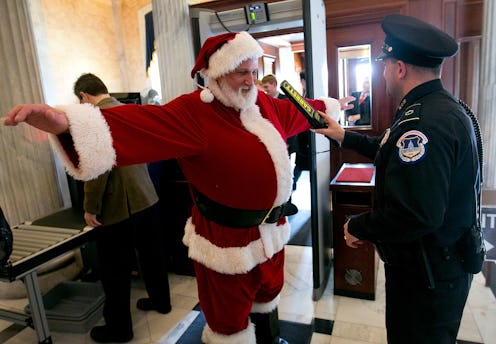News
A Santa Scam Is Hiding In Your Email
"You'd better watch out! You'd better not cry! But you damn well should doubt, I'm telling you why: Because Santa Claus is being used by Internet con artists to scam you out of moneyyyyy." Okay, so that's not as catchy as the original, but it is a devastating, necessary update to this year's holiday jingles as faux Claus letter packages circle through parents' in-boxes. Couldn't we have left Santa out of this?
The Better Business Bureau issued a very punny warning about the email scam earlier this month. An unsolicited email arrives in your in-box, promising your child a customized handwritten letter from Santa with a certified spot on the "nice" list. "Santa's special package" goes for $19.99, a pretty sweet deal if it guarantees you that you won't get a lump of coal! And the free shipping ends in just hours! How fortunate that the email found its way to you before the deal of a lifetime has lapsed!
The only catch is that it is a complete and total fake. As the Better Business Bureau so poetically put it, "Santa never responds and you've just opened the door for the cyber Grinch..." The BBB says that at the very least you've given away an Andrew Jackson to thieves. But in the worst-case scenario, you may have opened yourself up to identity theft.
Oh, no, no, no!
Clicking the "Check It Out Now!" takes you to this fake site:
If you're wondering how people still fall for email scams, let me be clear: This isn't last decade's Nigerian prince. Although early scammers sent screeds riddled with spelling errors promising vast sums of money, today's scammers are a little more subtle, and thus, more believable. There is a wealth of more sophisticated ruses that have been birthed as cyber criminals' creativity catches up to the increasingly savvy Web users. Susan Bach, managed of the Wisconsin Better Business Bureau's northeast regional office, told USA TODAY:
Cyber criminals are getting more creative. This is their full-time job — to con you out of your money.
The holidays are prime territory for these types of scams. Parcel scams and fake shopping sites were cited as two of the most prolific of the season. So as you're busy clicking away your hard-earned money for friends and family, be sure to double-check emails and URLs to make sure they're legit.
Even with the new techniques in place, it doesn't mean ludicrous emails have stopped entirely. In my inbox just this morning, only one line in its entirety, I had a note asking casually if I had gotten the last message about my apparent $2 million fortune. And sitting above my monthly savings summary, which informed me that I had tucked away a whopping $5, I could begin to see why people want so desperately for these to be true.
Images: Yahoo Tech (2)
